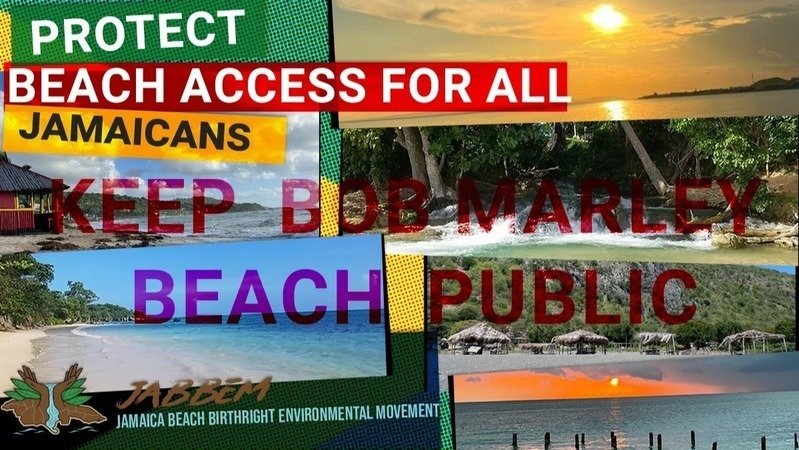Ziggy And Cedella Marley Join Fight To Keep Bob Marley Beach Open To The Public

Ziggy Marley and his sister Cedella have joined the Jamaica Beach Birthright Environmental Movement’s (JABEM) bid to get the Government of Jamaica to make unconditional access to, and use of all Jamaica’s beaches, including the Bob Marley Beach in St Andrew, a Constitutional Right.
On Friday, Ziggy, who is the eldest son of Bob Marley, shared a poster for the petition titled Protect Beach Access for all Jamaicans & keep Bob Marley Beach Public , which calls for “the protection of public access to Jamaican beaches, including the declaration of general and unfettered rights to the entire beach and river ecosystems, to be constitutionally enshrined as pillars of the country’s ecological heritage”.
The petition notes that the JABEM is “alarmed by recent events at the Bob Marley Beach in Bull Bay, St. Thomas, a favourite spiritual retreat of the late Bob Marley, where the Jamaican public came under imminent threat of losing access to yet another community beach, along with the destruction of fisherfolk livelihood and land dispossession of prominent Rastafari family members”.
In making his support for the movement clear, in his discussion on Instagram, the Rebellion Rises singer said that he was particularly aggrieved as “they are also trying to intimidate, cheat and force locals who have been there since I was a baby from these areas.”
“When I was younger, we freely had access to most of our local off the beaten path beaches and rivers including Bull bay and Cane river. Now, there is a pressure campaign to privatize more of these local beaches and rivers and deprive Jamaicans and in particular Jamaicans who cannot afford to pay for a day of well needed stress relief and rejuvenation of these natural resources,” Ziggy declared in his caption.
“Jamaica is one of the only Islands in the Caribbean that does not guarantee its people GENERAL rights of access to its beaches. There is no GENERAL RIGHT to bathe, fish, or walk along the beach. We always enjoy and encourage visitors to our Island and ask them to join us in making sure that Jamaican people today can freely enjoy Jamaican waters like many of us did before,” he added.
Over on Cedella’s Instagram page, she shared the post and expressed similar sentiments.
“Jamaican people should be able to freely enjoy Jamaican waters like many of us did before,” she noted.
The petition, which is listed on change.org, notes, additionally, that the threat of beach access loss remains at a high level, and is systemic across the island including areas such as Bluefields and Little Bay in Westmoreland; Cousins Cove in Hanover; Cornwall beach St. James, Alligator Pond in St Elizabeth and Mammee Bay, Peach Beach and Little Dunn’s River beaches in St. Ann.
The document also lists north-eastern beaches such as Reggae Beach and Lagoon at Goldeneye in St. Mary and San San and Dragon Bay in Portland as other affected beaches.
“It is at a crisis level, and if not addressed soon, Jamaica’s beaches will eventually be fenced off from its citizens,” the petition stated.
The JABEM’s petition, which is targeted to “Prime Minister Andrew Holness and the Jamaican Government”, Governor General Patrick Allen, and King Charles III, also notes that the people of Jamaica and its Diaspora “along with friends of Jamaica worldwide” are calling for the repeal and replacement of the Beach Control Act of 1956.
The group describes the Beach Control Act of 1956, as a “colonial-era law that is discriminating against the Jamaican people in restricting their unfettered access to the beaches and use of the sea and rivers, while promoting the ecological degradation of the Jamaican coastline.”
“We recognise that in Jamaica, the public does not have general rights to access the beach and use the sea and rivers…The Act, that remained in place until Jamaica got independence in 1962 did not give the island nation’s 2.7 million people the legal right to beach access.
“Jamaica needs a modern law that grants general and unfettered access rights to all beaches, rivers and sea around Jamaica, whilst guarding against ecological degradation… This law is arguably racist and should have no place in the body of laws of Jamaica and must be repealed and replaced immediately,” the petition adds.
The JABEM also pointed to, as evidence of discrimination, the fact that even the Government of Jamaica’s Beach Access and Management Policy For Jamaica states that “in Jamaican common law, the public has no general rights of access to the foreshore except to pass over it for the purpose of navigation or fishing and “there is therefore no general right of bathing, or to walk along the foreshore, except where acquired by custom or prescription, nor is there any general right to fish except as provided in Section 3(3) of the Beach Control Act, 1956.”
The petition also warned that the rush by the ultra-rich to grab beachfront properties at the expense and exclusion of Jamaicans should not be tolerated.
“We recognise that as a result, controlling beaches has become the new gold rush in Jamaica; impacting the livelihood of fisherfolks and the environment. Mass commercialization from beachfront tourism enterprises is also fueling the displacement of vulnerable Jamaicans from lands adjoining the sea. If this exclusion of the Jamaican people from the ecological heritage of the island is not stopped, it could possibly lead to social unrest and upheaval,” it said.

